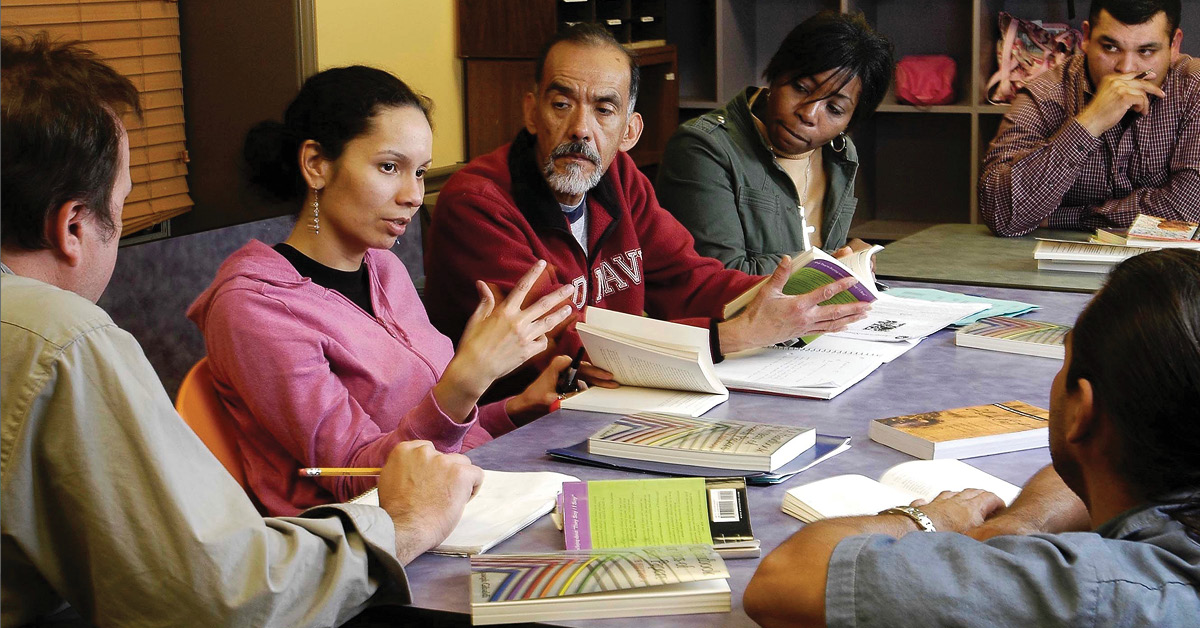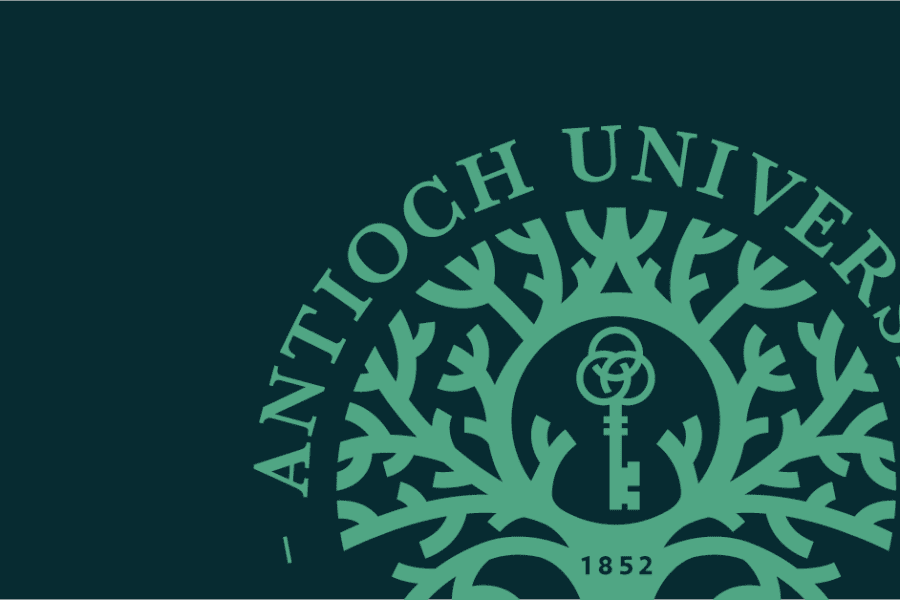This February, Antioch received a grant from the National Endowment for the Humanities that will support the creation and delivery of a new series of four free-to-attend classes for low-income adults in partnership with the Clemente Course in the Humanities. The new class series is titled Inflection Points and focuses on how the humanities can help us navigate very real social, cultural, environmental, and economic challenges.
These classes offer learners the opportunity to study classical humanities texts alongside the work of historically disenfranchised thinkers and contemporary writers and artists. In all of these classes, instructors will encourage students to think about the pivotal moments they are living through. Feedback from learners has revealed how important this time to connect and think is. “We saw how enthusiastically and avidly our students who are already enrolled in Clemente stayed connected once COVID started,” says Lela Hilton, the Executive Director of the Clemente Course in the Humanities, who herself is an Antioch alum. “It really underscored to us that the humanities have a lot to teach us and that they offer us tools to understand our experiences when so many of our other ways of coping just don’t seem to make sense anymore.”
The grant from the National Endowment for the Humanities will allow Antioch and Clemente to cover all financial costs for students—tuition as well as travel, childcare, and technology stipends. The classes will be offered in a hybrid model combining online and in-person instruction—a model that builds on both the Clemente Course in the Humanities and Antioch’s commitment to increasing accessibility to higher education.
A Partnership for Equitable Education
The relationship between Antioch and the Clemente Course in the Humanities—a nonprofit organization that partners with universities to support access to humanities-based higher education for low-income adults—goes back twenty-three years, to 1999. That was when Antioch Los Angeles founded the Clemente-inspired Bridge Program, a zero-cost set of classes aimed at helping Angelenos develop the skills and confidence to move forward with college education. In 2016, Antioch Seattle teamed up with Clemente’s Veterans Initiative to open a course providing free liberal arts education to veterans. (Read our full article about these programs from the 2021 Antioch Alumni Magazine.) Today, with this new grant and plans for the Inflections Points series of courses, that collaboration will continue to grow.
Clemente and Antioch both share the core convictions that access to education empowers people. Clemente serves non-traditional adult students who often face a nexus of different challenges to attending college. Beyond the Veterans Initiative, Clemente engages people transitioning out of the justice system, for people who are under-employment, and for people dealing with housing insecurity, substance abuse, domestic violence or mental illness. Most Clemente students are in their thirties or forties. Many are first-generation college students, most have experienced extended gaps in their education, and often these students are living under 200% of the national poverty level. These classes create opportunities for students to develop critical, reflective, and creative skills that will improve not only their individual lives but also those of their families, communities, and society at large.
For Antioch, this partnership provides an opportunity to reach learners it may not otherwise reach. While Antioch’s accreditation and infrastructure support the transition to online delivery and a pathway to enrollment in future higher education, Clemente provides the community ties that Antioch needs to maintain accessibility. “Through the Clemente model we can work with these students,” says Ingrid Ingerson, the Director of Continuing Education and Community Partnerships Education at Antioch Seattle. “It’s all the things that Antioch holds as its central mission: that education is transformative, and that everybody deserves a high-quality education.”
When two institutions with similar goals work together in a reciprocal, rather than transactional model, they can come up with new ways to serve the community. The development of the Inflection Points class series is one example of this. Clemente saw a need for students to maintain their connection beyond the first set of classes and wanted to create a network of students from different areas that wouldn’t otherwise meet. In Antioch, they found a partner who was excited about the opportunity to dismantle barriers to access and could also offer Clemente graduates the opportunity to continue their education through Antioch’s extensive place-based and online programs. “When you have a partnership that really understands the alignment of their missions, there’s a lot of liberation in that,” says Hilton. “There’s a lot of creativity in that. And a lot of soul in it, too.”
Four Themes for Today’s World
The Inflection Point series will offer four themed classes that reflect challenges facing our society. In the New Bedford, Massachusetts course “No Silence Among Friends,” the core focus is Civil Rights. In Austin, Texas students will look at constructions and deconstructions of national borders with a class titled “No Borderlands/Sin Fronteras.” Indigenous relationships to land and water through art, literature, and philosophy will be the focus in a class titled “Time, Memory, and Transformation: Restoring the Salish Sea” in Seattle, Washington. Finally, in Los Angeles, learners will study historical and contemporary depictions of environmental impact and human relationships in the class “This Land: Environmental Humanities.”
The need for classes focused on these topics is great. These past years have seen many cultural upheavals—mass death caused by COVID-19, militarized responses to actions protesting the murder of Black people, the lived realities of climate disaster, insurrection at the US Capital, and widespread legislation discriminating against trans people, among many other crises. In light of all of this, the Inflection Points classes will use art, philosophy, history, and literature that has been created in response to historical moments to open conversations about what others have done on the precipice of change—and ask what we can contribute as well. And the curriculum will especially focus on the experience of people living in the United States who have regularly faced state violence, those descended from people who were enslaved, and Indigenous people who still don’t have access to their land. The crises facing the US today are by no means without precedent—and there is a depth of knowledge often overlooked from these perspectives. The Inflection Points courses will bring this material to people who want to engage with it.
The Inflection Points series asks how writers, thinkers, artists, and historians find meaning, reconciliation, and transformation in the wake of war, colonization, genocide, disease, and political unrest. Each of these themes is a fertile place to ask how learners may also find meaning. Because most students enrolled in the courses will have already finished their first-year Clemente coursework, they will have a foundational knowledge of classical humanities texts. From this base, these classes can shift the focus towards reflection and application rather than theory and historical context. For the first time, Clemente classes will include an applied humanities project. “For Clemente, the real brass ring is that sense of civic engagement,” Hilton says. “And having our students feel empowered to go into their communities or their school boards or their families, and make things change.”
Ultimately, that civic engagement and the four courses fit squarely into Antioch’s broader social justice mission. In this time when our democratic political system and its ability to survive are at the forefront of national discourse, such a program could not be more relevant. And it fits into the larger mission of Antioch, as spelled out by Antioch University’s Chancellor, Bill Groves, who says that changes in the rhetoric around education are necessary within institutions and society. “Higher education has an obligation to use its institutional voice to support democracy,” he says. “Without it, there can be no social justice.”
With this expansion of zero-cost liberal arts education through Inflection Points, Antioch and Clemente are providing learners the opportunity to reflect on their power and positions in society. Says Hilton, “As an educator, but also as a citizen, that’s the heart of this work for me: those moments where our students really see, really feel their own sense of activation and engagement.”




